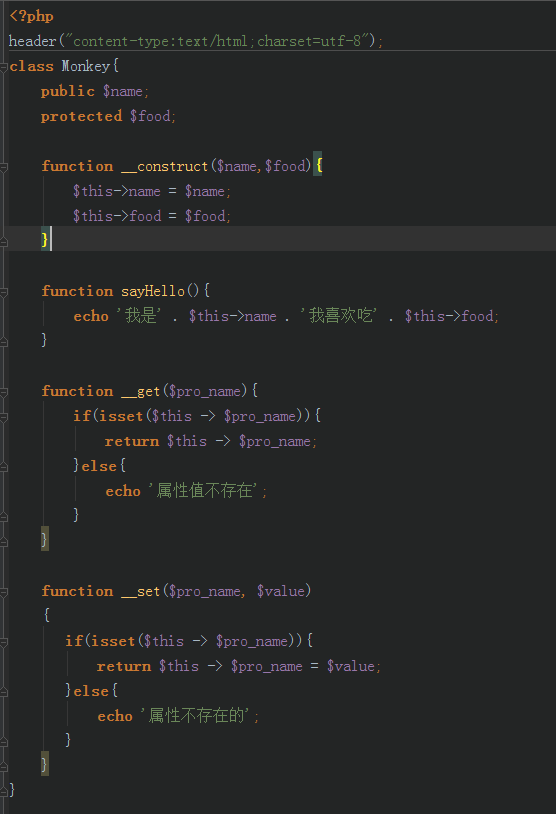Summary of _construct() method examples
This article mainly introduces the difference between the constructor _construct() and _initialize() of the class in ThinkPHP. The introduction is very detailed. I believe it has certain reference value for everyone. Friends who need it can read it together. Take a look. Preface I believe that PHPers who are familiar with THINKPHP are basically familiar with the _initialize() method. It seems that we rarely use _construct() unless we write a plug-in ourselves, otherwise it is really rarely used. Looking at the code today, I suddenly saw _construct(), the construction method that comes with PHP. My first impression was that it was relatively unfamiliar. Although I often encountered it when I was learning Java before, I have basically forgotten it after a long time. My usual habit is to write down the key points of knowledge in my small notebook, but since I haven’t written for a long time, the elegant and flexible writing style I used to have in high school has completely disappeared into another dimension. In addition to the previous thoughts, I came to learn how to write blogs from technology experts. This is not to show off, but just to prevent every bit of the results of my work from dissipating with the passage of time. Let’s take a look at the detailed introduction. Paste the code first (my environment is wamp
1. Detailed introduction to _initialize()

Introduction: This article mainly introduces the difference between the constructor _construct() and _initialize() of the class in ThinkPHP. The introduction in the article is very detailed. I believe it will be useful to everyone. For reference, friends in need can take a look below. Preface I believe that phpers who are familiar with THINKPHP are basically familiar with the _initialize() method. We rarely use _construct() unless we write a plug-in ourselves. It is really rarely used. Today I looked at the code and suddenly saw _construc...
2. php Summary of usage of constant() function instances

# Introduction: When you see this name, it gives you a very advanced feeling. Yes, the magic method is indeed very advanced. , what are magic methods? In PHP, methods starting with two underscores are called "Magic methods", such as __construct(), __destruct (), __clone() mentioned before. And __call(),,__get(), __set(),__sleep(), __wakeup(), __toS...
3. About the php __construct() function 10 recommended articles
Introduction: When you see this name, you have a very advanced feeling. Yes, the magic method is indeed very advanced. So, what is magic? What about methods? In PHP, methods starting with two underscores are called "Magic methods", such as __construct(), __destruct (), __clone(), and __call(). ),,__get(), __set(),__sleep(), __wakeup(), __toS...
4. 10 articles about php sleep() function Recommendation

5.
Detailed explanation of magic method __get() instance (php advanced object-oriented tutorial 2)

6.
Introduction to the sixteen magic methods of PHP

Introduction: In PHP, methods starting with two underscores __ are called magic methods (Magic methods). These methods act as played a decisive role. Magic methods include: __construct(), class constructor
7. Simple code introduction to PHP singleton mode

##Introduction:
8. Detailed explanation of problems encountered in inheritance of PHP singleton mode

Introduction:
9. Detailed introduction to classes in ThinkPHP The difference between constructor _construct() and _initialize()

10.
A concise summary of Magic Method in PHP classes

[Related Q&A recommendations]:
DateTime in PHP 7.1:: Does __construct() support millisecondsHow does the PHP function pass only the specified parametersHow does the PHP function pass only the specified parametersjavascript - What is the difference between the "constructor" with the first letter capitalized in js and the "constructor" starting with a double underscore in a class? Can there be two constructors in a php class?
The above is the detailed content of Summary of _construct() method examples. For more information, please follow other related articles on the PHP Chinese website!

Hot AI Tools

Undresser.AI Undress
AI-powered app for creating realistic nude photos

AI Clothes Remover
Online AI tool for removing clothes from photos.

Undress AI Tool
Undress images for free

Clothoff.io
AI clothes remover

Video Face Swap
Swap faces in any video effortlessly with our completely free AI face swap tool!

Hot Article

Hot Tools

Notepad++7.3.1
Easy-to-use and free code editor

SublimeText3 Chinese version
Chinese version, very easy to use

Zend Studio 13.0.1
Powerful PHP integrated development environment

Dreamweaver CS6
Visual web development tools

SublimeText3 Mac version
God-level code editing software (SublimeText3)

Hot Topics
 Explain JSON Web Tokens (JWT) and their use case in PHP APIs.
Apr 05, 2025 am 12:04 AM
Explain JSON Web Tokens (JWT) and their use case in PHP APIs.
Apr 05, 2025 am 12:04 AM
JWT is an open standard based on JSON, used to securely transmit information between parties, mainly for identity authentication and information exchange. 1. JWT consists of three parts: Header, Payload and Signature. 2. The working principle of JWT includes three steps: generating JWT, verifying JWT and parsing Payload. 3. When using JWT for authentication in PHP, JWT can be generated and verified, and user role and permission information can be included in advanced usage. 4. Common errors include signature verification failure, token expiration, and payload oversized. Debugging skills include using debugging tools and logging. 5. Performance optimization and best practices include using appropriate signature algorithms, setting validity periods reasonably,
 How does session hijacking work and how can you mitigate it in PHP?
Apr 06, 2025 am 12:02 AM
How does session hijacking work and how can you mitigate it in PHP?
Apr 06, 2025 am 12:02 AM
Session hijacking can be achieved through the following steps: 1. Obtain the session ID, 2. Use the session ID, 3. Keep the session active. The methods to prevent session hijacking in PHP include: 1. Use the session_regenerate_id() function to regenerate the session ID, 2. Store session data through the database, 3. Ensure that all session data is transmitted through HTTPS.
 What are Enumerations (Enums) in PHP 8.1?
Apr 03, 2025 am 12:05 AM
What are Enumerations (Enums) in PHP 8.1?
Apr 03, 2025 am 12:05 AM
The enumeration function in PHP8.1 enhances the clarity and type safety of the code by defining named constants. 1) Enumerations can be integers, strings or objects, improving code readability and type safety. 2) Enumeration is based on class and supports object-oriented features such as traversal and reflection. 3) Enumeration can be used for comparison and assignment to ensure type safety. 4) Enumeration supports adding methods to implement complex logic. 5) Strict type checking and error handling can avoid common errors. 6) Enumeration reduces magic value and improves maintainability, but pay attention to performance optimization.
 Describe the SOLID principles and how they apply to PHP development.
Apr 03, 2025 am 12:04 AM
Describe the SOLID principles and how they apply to PHP development.
Apr 03, 2025 am 12:04 AM
The application of SOLID principle in PHP development includes: 1. Single responsibility principle (SRP): Each class is responsible for only one function. 2. Open and close principle (OCP): Changes are achieved through extension rather than modification. 3. Lisch's Substitution Principle (LSP): Subclasses can replace base classes without affecting program accuracy. 4. Interface isolation principle (ISP): Use fine-grained interfaces to avoid dependencies and unused methods. 5. Dependency inversion principle (DIP): High and low-level modules rely on abstraction and are implemented through dependency injection.
 Explain late static binding in PHP (static::).
Apr 03, 2025 am 12:04 AM
Explain late static binding in PHP (static::).
Apr 03, 2025 am 12:04 AM
Static binding (static::) implements late static binding (LSB) in PHP, allowing calling classes to be referenced in static contexts rather than defining classes. 1) The parsing process is performed at runtime, 2) Look up the call class in the inheritance relationship, 3) It may bring performance overhead.
 What is REST API design principles?
Apr 04, 2025 am 12:01 AM
What is REST API design principles?
Apr 04, 2025 am 12:01 AM
RESTAPI design principles include resource definition, URI design, HTTP method usage, status code usage, version control, and HATEOAS. 1. Resources should be represented by nouns and maintained at a hierarchy. 2. HTTP methods should conform to their semantics, such as GET is used to obtain resources. 3. The status code should be used correctly, such as 404 means that the resource does not exist. 4. Version control can be implemented through URI or header. 5. HATEOAS boots client operations through links in response.
 How do you handle exceptions effectively in PHP (try, catch, finally, throw)?
Apr 05, 2025 am 12:03 AM
How do you handle exceptions effectively in PHP (try, catch, finally, throw)?
Apr 05, 2025 am 12:03 AM
In PHP, exception handling is achieved through the try, catch, finally, and throw keywords. 1) The try block surrounds the code that may throw exceptions; 2) The catch block handles exceptions; 3) Finally block ensures that the code is always executed; 4) throw is used to manually throw exceptions. These mechanisms help improve the robustness and maintainability of your code.
 What are anonymous classes in PHP and when might you use them?
Apr 04, 2025 am 12:02 AM
What are anonymous classes in PHP and when might you use them?
Apr 04, 2025 am 12:02 AM
The main function of anonymous classes in PHP is to create one-time objects. 1. Anonymous classes allow classes without names to be directly defined in the code, which is suitable for temporary requirements. 2. They can inherit classes or implement interfaces to increase flexibility. 3. Pay attention to performance and code readability when using it, and avoid repeatedly defining the same anonymous classes.






